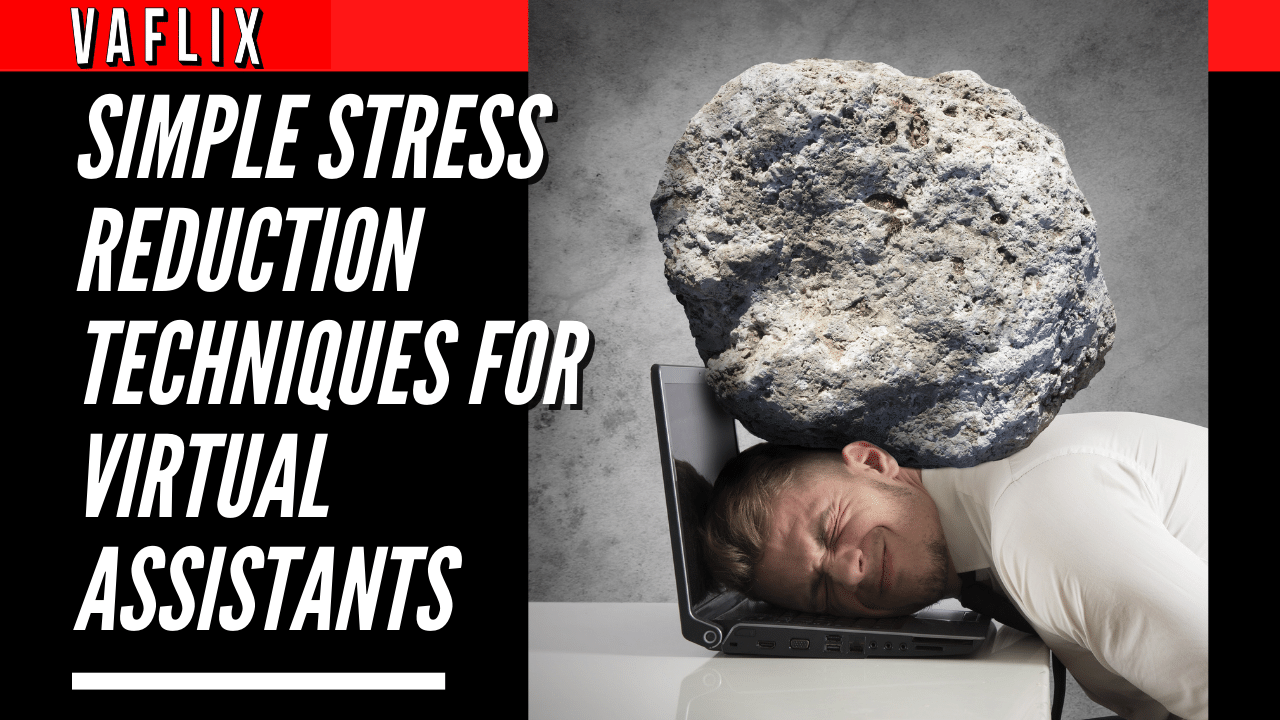Simple Stress Reduction Techniques for Virtual Assistants
Thinking of Hiring a Virtual Assistant?
Let’s just say that between the stress at work and the stress at home, along with the personal problems that have come up this year, your stress levels are probably at their highest right now.
The negative effects of stress can extend into both your personal and professional lives. Physical and emotional manifestations of the symptoms of extreme stress are possible.
Some common physical symptoms include aches and pains, diarrhea or constipation, nausea and lightheadedness, chest pain, rapid heartbeat, loss of libido, and recurrent colds. A person may experience emotional symptoms such as moodiness, irritability, or a quick temper in addition to agitation, difficulty relaxing, feeling overburdened, loneliness, and isolation, as well as depression or general unhappiness. These symptoms can be caused by a number of factors, including stress, loneliness, and isolation.
When we start to feel overwhelmed by stress here at VAFLIX, it is essential for us to examine the ways in which we can deal with it and identify the specific stressors that are causing it. The sources of tension in our lives can then be targeted for elimination, modification, adjustment, or simple acceptance.
- AVOID
During this trying time, we had to also master the art of politely declining offers of assistance. In both your personal and professional lives, it is important to be aware of and respect your boundaries.
Stay as far away from people who are a source of stress for you as you possibly can. You need to learn to take control of your environment; for instance, if watching scary movies makes you anxious, you shouldn’t watch them.
AVOID participating in contentious conversations on Facebook and steer clear of touchy subjects like religion and politics if they have a tendency to agitate you or provoke arguments.
And as a final step, streamline the items on your to-do list. Make a distinction between the “should” and the “musts,” and get rid of anything that isn’t absolutely necessary.
- ALTER
However, there were some stressful situations that we were unable to avoid, and rather than keeping our emotions bottled up, a few of us decided to talk to a friend about how we were feeling.
If there is something that is bothering you, communicate your concerns in an open and honest manner while maintaining your respect.
Keep in mind that you should always be willing to compromise. If you want to find a happy middle ground with someone, you need to be willing to change your own behavior first before you can ask them to change theirs.
In addition to this, you should have a confident demeanor and approach problems head-on. You should also try your best to anticipate and avoid potential issues. And as a final point, improve the way you manage your time. Be careful not to spread yourself too thin, or you’ll end up falling behind. When I was trying to figure out a problem, I stayed up through the entire night once, and I paid for it the next day by being sleepy and unproductive.
- ADAPT
You can learn to adapt to the stressful situation even if you are unable to avoid or change the stressor. Figure out how to look at stressful situations from a more upbeat point of view. One example of something that can be reframed as an opportunity for some time for reflection is a traffic jam. Consider the scenario as a whole when dealing with a stressful situation. Ask yourself how significant the source of stress will be in the long run and if it is really worth getting upset over it if it turns out to be unimportant. If not, you should shift your attention elsewhere.
You should readjust your expectations as well. Don’t put yourself in a position to fail by expecting perfection from both yourself and those around you. Maintain a positive attitude by reminding yourself of all of the many blessings in your life, including the positive aspects of yourself and the gifts you possess.
- ACCEPT
Accepting the aspects of stress that you cannot alter is another strategy for coping with the condition. Do not make the mistake of attempting to exert control over something that cannot be managed, which is a category that includes many aspects of our lives, including the actions of other people. Focus instead on things you can control, such as your reactions to problems.
When confronted with significant difficulties, it is important to keep an optimistic outlook and make an effort to see these obstacles as chances for personal development. When the pressure becomes too much to bear, talk to someone you can rely on for support. Even if you are unable to alter the circumstances, it may be therapeutic to verbalize the emotions you are experiencing. Make contact with your close companions!



















